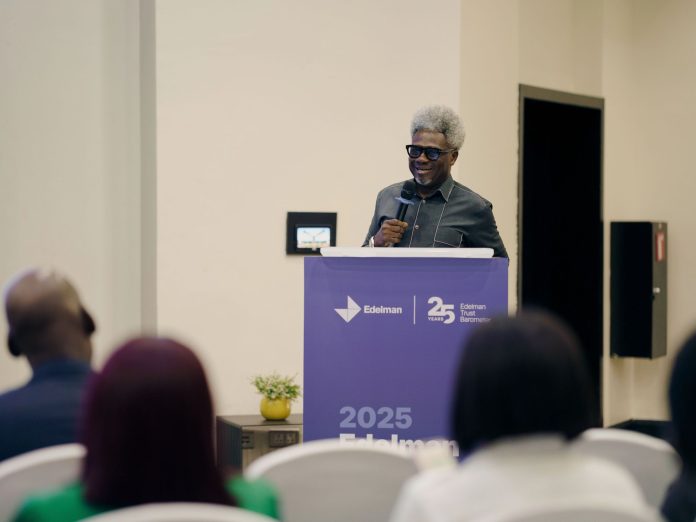Nigerians have shown a marginal increase in trust levels overall but continue to distrust their political leaders, according to findings from the 2025 Edelman Trust Barometer: Nigeria Report. The report, unveiled on the evening of April 16 at the Four Points by Sheraton Hotel, Lagos, reveals that trust in non-governmental organisations (NGOs), businesses, and media remains higher than in government institutions. Surprisingly, Nigerians trust artificial intelligence (AI) more than other Africans, despite expressing deep skepticism towards CEOs.
The event was organised by THOP – The Holding Opinion and Public, led by Kwame Senou, and featured a keynote address by Dr. Omoniyi Ibietan, fnipr, fapra, MACCE, MIIC, Head of Media Relations at the Nigerian Communications Commission (NCC). Dr. Ibietan stood in for Arik Karani, President of the African Public Relations Association (APRA), and shared insights on the nation’s evolving trust dynamics.
“In 2024, trust stood at 61 percent; in 2025, it has increased marginally,” Dr. Ibietan noted. “However, seven in ten Nigerians still believe their leaders lie, and the gap between rich and poor continues to widen, fueling a sense of injustice.”
The report highlights a growing income-based trust gap, with a majority of Nigerians believing that the wealthy disproportionately benefit from national resources. Notably, one in two respondents believe that hostile activism, including social media campaigns, can drive meaningful change.
One of the most striking findings came from Wandile Cindi, Edelman’s senior strategist from South Africa, who presented the 2025 report titled: “TRUST, AND THE CRISIS OF GRIEVANCE.” He observed that Nigerians show greater trust in AI than their African counterparts. Cindi speculated that this trust might be linked to Nigeria’s impressive roster of unicorn startups such as Interswitch, OPay, Moniepoint, Flutterwave, and Andela, all of which are valued at over $1 billion.
The report, now in its eighth year of Nigerian coverage, is part of a global study spanning 28 countries, with Nigeria, Kenya, and South Africa representing Africa. It focuses on trust across four institutions: government, business, media, and NGOs. Among these, NGOs and media rank highest in public trust, while the government ranks lowest.
Interestingly, Nigerians and Kenyans remain more optimistic about the future compared to South Africans, despite the challenges highlighted in the report.
The Edelman Trust Barometer continues to serve as a critical barometer of public sentiment and institutional trust worldwide, shining a light on the shifting perceptions that define civic and corporate life.





